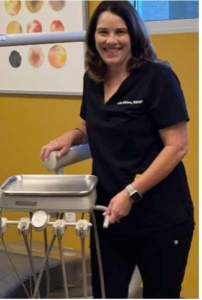By: Susan McLearan, BSDH, MS, RDHAP
November 21, 2021 – All Baby Boomers in the United States will be over 65 years of age by 2030 – making up more than 20% of the population. And just 30 years after that, those 85 years and older will triple, according to the US Census Bureau . This growing group fights an uphill battle to access the vital preventive and restorative oral care they need to maintain their health. Lack of personal mobility, transportation, and dental care insurance upon retirement, combined with often challenging living circumstances, can make access even more difficult. While provisions to address the problem were added to California’s historic Master Plan for Aging, they do not offer real solutions that can handle the enormity of the problem. However, programs exist in California that are turning things around by offering hygienists the chance to provide care in a flexible work environment. One of those programs is commonly referred to as PACE.
What is PACE?
PACE stands for Programs of All-Inclusive Care for the Elderly. It is a Medicare and Medicaid-funded program for adults 55 and older who live with chronic illnesses and are eligible for nursing home level care. The goal of PACE is to keep seniors living independently in their homes and communities. An 11-person team provides medical and dental care, physical and occupational therapy, transportation, meals, day programs, and home care assistance. The “one-stop-shop” day centers provide a welcome venue for seniors to receive care, socialize and have meals. PACE programs act as both the payor and the provider. This creates an incentive for these organizations to apply innovation and efficiency in keeping patients well, including added flexibility for dental care access. The all-encompassing approach to a more independent style of living produces 80% lower depression rates after nine months of enrollment and also leads to 98% of participants’ loved ones recommending PACE.
What is PACE in California?
PACE began in San Francisco more than 45 years ago and was the brainchild of Dr. William Gee and social worker Marie-Louise Ansak. They saw the need for alternatives to nursing homes and assisted living facilities so seniors can live healthier lives independently. Currently, there are 65 PACE programs in California serving more than 12,000 participants who are primarily dually eligible for Medicare and Medicaid.
For people with comparable needs, PACE is 42% less costly than institutional care, and will save California taxpayers $131 million in 2021. As part of becoming a PACE program, an organization such as “WelbeHealth” must outline its plan for providing at least the minimum required services. While dental services are listed, they are not among the minimum requirements on site.
What is WelbeHealth?
WelbeHealth provides full-service health care and personalized support to help seniors age well at home and in their community. The company currently operates four PACE programs in Stockton, Fresno, Pasadena, and Long Beach, with continuing expansion across California. Through a contract with a Registered Dental Hygienist in Alternative Practice (RDHAP) in the Stockton area, WelbeHealth is providing flexibility for dental professionals as part of its commitment to improving the lives of seniors and expanding opportunities for its team members. In addition to flexible hours and mobile clinics, hygienists especially enjoy the program because they are included as part of a broader coordinated interdisciplinary care team, so they have complete transparency around the patient’s health status. The WelbeHealth RDHAP program will be described in detail in a future article.
What Could This Mean for Dental Hygienists?
Lisa Gildea, RDH, RDHAP, is newly contracted with WelbeHealth to provide hygiene services and works with a contracted dentist. Together they provide complete dental care to participants, most of whom have extensive dental needs because they have not had access to routine dental care for some time before enrollment.

Lisa Gildea, RDH, RDHAP in WelbeHealth dental operatory
The WelbeHealth center has a dental suite that Lisa uses for patients (called participants by the program) who may be driven to the site by Welbe’s transportation service. Due to potential exposure to COVID-19, WelbeHealth has taken extra precautions to ensure its participants stay safe and protected, including deploying a HomePACE model to provide services in participants’ homes or skilled nursing facilities. COVID 19 provided the incentive for WelbeHealth to develop mobile and portable dental services, which Lisa is spearheading with the disciplinary care teams. She treats patients whether they live in their own homes, intermediate care facilities, or skilled nursing facilities when needed. Also, in collaboration with the WelbeHealth outreach team, Lisa will participate in the coming Smile Campaign, set to launch in January 2022 to promote dental health.
While other PACE operators may increase their commitment to oral health, will other hygienists find similar opportunities to contract with them and use their skills on behalf of the elderly? Interested hygienists may wish to consult the Department of Health Care Services website to determine if nearby programs exist. In our next issue, we will detail the experience of Lisa Gildea, RDH, RDHAP, part of the innovative team delivering services to this important population through the PACE/WelbeHealth program.
About the Author
Susan McLearan, BSDH, MS, RDHAP, is a career-long member of CDHA and has been a CDHA President. Currently, she serves as a Trustee and a member of both the Government Relations and Alternative Practice Councils. As a liaison to several governmental groups and oral health organizations, she advocates for the inclusion of oral health and dental hygiene providers in all areas of health policy.
(Originally published in CDHA – California Dental Hygienists’ Association Journal)